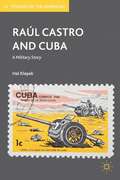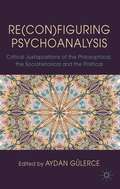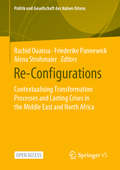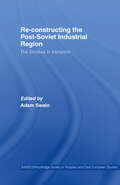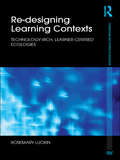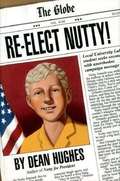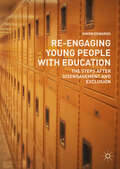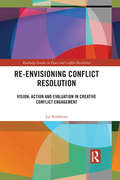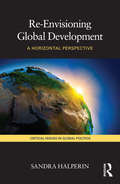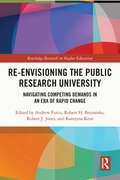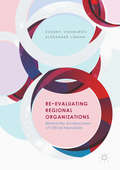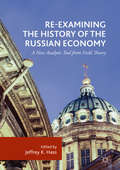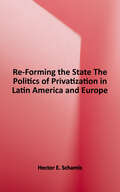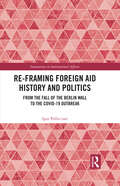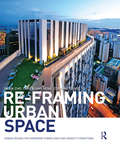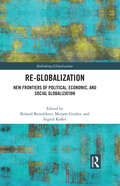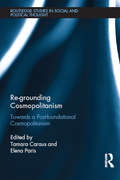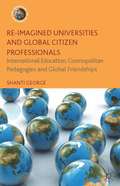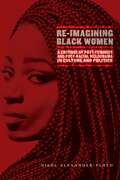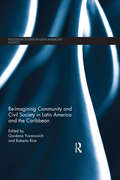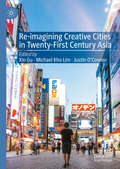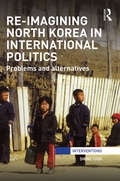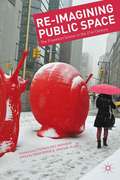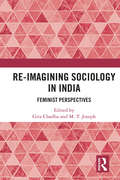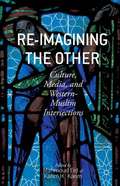- Table View
- List View
Raúl Castro And Cuba: A Military Story ( Studies of the Americas)
by Hal KlepakRaúl Castro and Cuba tells the story of the military life of the longest serving minister of defense of any country in recent times. While the picture that often emerges of Raúl Castro is that of a colorless younger brother of Fidel—a product essentially of that grander figure—this book analyzes Raúl Castro as a man of his own, a politician and an impressive military commander and organizer, as well as a highly original thinker on both military matters and wider national issues that have faced the Cuban state for more than half a century. Filling a gap in recent scholarship, it demonstrates that the government he has put into place in Cuba in the last four years is very much his, and is not, as some believe, a mere shadow of his brother's.
Re(con)figuring Psychoanalysis: Critical Juxtapositions of the Philosophical, the Sociohistorical and the Political
by Aydan GülerceLeading international scholars present novel dialogues between different psychoanalytic orientations as well as between the particularities of diverse socio-cultural and historical contexts in order to offer critical insights which are highly relevant to the current intellectual debates and social praxis.
Re-Configurations: Contextualising Transformation Processes and Lasting Crises in the Middle East and North Africa (Politik und Gesellschaft des Nahen Ostens)
by Friederike Pannewick Rachid Ouaissa Alena StrohmaierThis edited volume is an open access title and assembles both the historical consciousness and transformation of the MENA region in various disciplinary and topical facets. At the same time, it aims to go beyond the MENA region, contributing to critical debates on area studies while pointing out transregional and cultural references in a broad and comparative manner.
Re-Constructing the Post-Soviet Industrial Region: The Donbas in Transition (BASEES/Routledge Series on Russian and East European Studies)
by Adam SwainThis book examines the political economy of attempts to restructure the Donbass, one of the Soviet Union's most important 'old economy' 'rustbelt' industrial regions. It shows how local interest groups have successfully frustrated the central government's and the World Bank's proposed market-oriented restructuring, and how a manufacturing-based regional economy is surviving, partially, with restructuring postponed.
Re-Designing Learning Contexts: Technology-Rich, Learner-Centred Ecologies (Foundations and Futures of Education)
by Rosemary LuckinWhat do we mean by the word ‘context’ in education and how does our context influence the way that we learn? What role can technology play in enhancing learning and what is the future of technology within learning? Re-Designing Learning Contexts seeks to re-dress the lack of attention that has traditionally been paid to a learner’s wider context and proposes a model to help educators and technologists develop more productive learning contexts. It defines context as the interactions between the learner and a set of inter-related resource elements that are not tied to a physical or virtual location. Context is something that belongs to an individual and that is created through their interactions in the world. Based on original, empirical research, the book considers the intersection between learning, context and technology, and explores: the meaning of the concept of context and it’s relationship to learning the ways in which different types of technology can scaffold learning in context the Learner-Centric ‘Ecology of Resources’ model of context as a framework for designing technology-rich learning environments the importance of matching available resources to each learner’s particular needs the ways in which the learner’s environment and the technologies available might change over the coming years the potential impact of recent technological developments within computer science and artificial intelligence. This interdisciplinary study draws on a range of disciplines, including geography, anthropology, psychology, education and computing, to investigate the dynamics and potential of teacher-learner interaction within a learning continuum, and across a variety of locations. It will be of interest to those teaching, researching and thinking about the use of technology in learning and pedagogy, as well as those involved in developing technology for education and those who use it in their own teaching. For practical examples of the way the Ecology of Resources framework has been used visit: http://eorframework.pbworks.com.
Re-Elect Nutty (Nutty Nutsell #8)
by Dean HughesNutty is a boy any kid who reads will want to know. He gets teased, fights with his sisters, isn't stuck up, follows good and bad advice, takes chances, gets caught, sticks with his friends, feels ambitious, is lazy, and is cool in a regular sort of way. In this last book in the series about him it's time to pick a student council president again. The fact that he made a terrible student council president the year before doesn't make a difference. Frederick Nutsell--better known as Nutty--decides he has learned from his mistakes, has a few ideas, and would like to give the presidency another shot. And he is determined to be honest and straightforward throughout the campaign. In fact, he has his slogan all worked out: "I messed up last year, but next year I'll do a better job." But then Nutty learns that the leading candidate is his archrival, Mindy, and the mud begins to get slung. Who is printing up the fliers saying all those rotten things about Nutty? (Even if they are true?) Nutty is sure it is Mindy and her campaign staff, but he can't prove it. How can he stay above it all when these kinds of dirty tricks are being played? Tempted to pull some dirty tricks of his own, Nutty manages only to make things worse for himself, until he finally uncovers the secret behind the dirty tricks--a surprising one at that--and ultimately does the right thing. Those who have read Dean Hughes's Nutty for President and the other books in the Nutty series will be eager to follow these further funny, and poignant, adventures. Look! Bookshare has all eight of the books in the Nutty Nutsell series which are: Nutty for President, Nutty and the Case of the Mastermind Thief, Nutty and the Case of the Ski Slope Spy, Nutty Can't Miss, Nutty Knows All, Nutty the Movie Star and Nutty's Ghost.
Re-Engaging Young People with Education: The Steps after Disengagement and Exclusion
by Simon EdwardsThis book examines how young people can be re-engaged with schooling and their own learning beyond the school gates. Despite attempts by successive UK governments to promote engagement with education, there has been a substantial increase in formal and informal exclusions from secondary schools, particularly of underperforming students who come from low income families. The book builds on an ethnographic study carried out in a youth centre based on a secondary school site, exploring the social and cultural worlds of fourteen students as they complete a GCSE teamwork assessment. Analysing the ‘translation’ process of the students as they relocate their understanding of teamwork into the language of assessment, the author posits that student identity is a holistic individual project, where knowledge is produced within the conditions for the production of the self-narrative. This volume calls to educators to recognise the importance of relational pedagogy rooted in social practices, rather than individual cognitive performance. It is sure to be of value and interest to students and scholars of exclusion in education and relational pedagogy, as well as practitioners and policy makers.
Re-Envisioning Conflict Resolution: Vision, Action and Evaluation in Creative Conflict Engagement (Routledge Studies in Peace and Conflict Resolution)
by Jay RothmanThis book explores the process of assessing success in the field of conflict resolution, with a focus on the Action Evaluation method pioneered by the author. Since the early days of the field of conflict resolution, researchers and practitioners have been trying to determine how to define and assess success. Are its various approaches to engaging conflict effective? How is effective defined and operationalized and by whom? How might we know? Action Evaluation (AE), a methodology for defining, promoting and assessing success in and of the field, has been developed over the past two decades to answer these questions theoretically and in-use. It was designed from its inception to help create sound and contextualized standards around which the field could coalesce. AE is an appropriate methodology for evaluation of conflict engagement, in part because it is grounded in key values of the field, like participation, ownership and the constructive engagement of conflict among stakeholders in project development and implementation. By illustrating how AE is applied through case studies, and providing tools for others to use, this book is intended to make AE a more widely available, user-friendly and rigorous action-research tool for researchers and practitioners in the still-emerging field and beyond. This book will be of much interest to students of conflict resolution, peace studies, research methods and international relations in general, as well as practitioners in the field.
Re-Envisioning Global Development: A Horizontal Perspective (Critical Issues in Global Politics)
by Sandra HalperinRe-Envisioning Global Development offers an original conceptualisation of capitalist development from its origins to the present day. Most approaches to understanding contemporary development assume that industrial capitalism was achieved through a process of nationally organised economic growth, and that in recent years its organisation has become increasingly trans-local or global. However, Halperin shows that nationally organised economic growth has rarely been the case – it has only recently come to characterise a few countries and for only a few decades. This innovative text elaborates an alternative ontology and way of thinking about global development during the last two centuries – one linked, not to nations and regions, but to a set of essentially trans-national relations and connections. It argues that capitalist development has, everywhere and from the start, involved—not whole nations or societies–but only sectors or geographical areas within states. By bringing this aspect of historically ‘normal’ capitalist development into clearer focus, the book clarifies the specific conditions and circumstances that enabled European economies to pursue a more broad-based development following World War II, and what prevented a similar outcome in the contemporary ‘third world’. It also clarifies the nature, spatial extent, and circumstances of current globalising trends. Wide-ranging and provocative, this book is required reading for advanced level students and scholars in development studies, development economics and political science.
Re-Envisioning the Public Research University: Navigating Competing Demands in an Era of Rapid Change (Routledge Research in Higher Education)
by Andrew Furco Robert H. Bruininks Robert J. Jones Kateryna KentThis volume explores the numerous and competing demands that face America’s public research universities and considers how institutions and their leaders can best navigate this challenge to ensure longevity, relevance, and success on the local, national, and global stage. Today’s public research universities have the unique challenge of responding to new societal pressures and policies, while remaining true to their core educational missions and values. Highlighting the multiple roles that universities must now fulfil – as institutions of higher learning, as research bodies, as institutions with global reputations, and as organizations that serve the public – the volume asks how they can best evolve in the rapidly changing education landscape. Tackling subjects such as faculty culture, the role of technology, financial sustainability, institutional identity, diversity, and organizational development, chapters identify innovative and transformative mechanisms for acclimatizing the public research university to current educational, academic, and societal needs. This text will benefit researchers, academics, and educators with an interest in higher education, educational reform and policy, and the sociology of education more broadly.
Re-Evaluating Regional Organizations
by Alexander Libman Evgeny VinokurovThis book re-evaluates the regional organizations landscape and discusses how organizations with similar mandates can exercise strikingly different goals. Even economic organizations, which do not produce any outcomes in terms of economic cooperation, can be valuable for their members or individual stakeholders. The book's argument is supported by a combination of quantitative and qualitative methods. It employs a novel dataset of 60 regional organizations to establish correlations between members' goals and their characteristics. More than a dozen case studies in Latin America, Africa, Middle East, Southeast Asia, and post-Soviet Eurasia illustrate the theoretic arguments of how particular types of regional organizations come into existence and evolve. Finally, the book examines the remarkable resilience of regional organizations and considers the conditions under which the stakeholders are willing to abandon support.
Re-Examining the History of the Russian Economy: A New Analytic Tool from Field Theory
by Jeffrey K. HassThis book explores the application of field theory (patterns of interaction) to Russian economic history, and how social and political fields mediate the influences of institutions, structures, discourses and ideologies in the creation and dissemination of economic thinking, theory and practice. Using focused cases on Russia's economy from the mid-nineteenth century to the present, Hass and co-authors expand the empirical basis of field studies to provide new material on Russian economic history. The cases are divided into two complementary halves: i) The role of fields of institutions, discourses, and structures in the development of Russian economic thought, especially economic theories and discourses; and ii) The role of fields in the real adoption and implementation of policies in Soviet and Russian economic history. With developed discussion of fields and field theory, this book moves beyond sociology to demonstrate to other disciplines the relation of fields and field theory to other frameworks and methodological considerations for field analysis, as well as providing new empirical insights and narratives not as well-known abroad.
Re-Forming the State: The Politics of Privatization in Latin America and Europe (Interests, Identities And Institutions In Comparative Politics Ser.)
by Hector E. SchamisWith evidence drawn from Argentina, Chile, Mexico, Great Britain, and Hungary, Re-forming the State examines the processes leading to, and the political effects of, market reform experiments and focuses specifically on the patterns of collective action and coalition building that drive privatization. The author's argument calls into question established approaches in the discipline of economics and in the fields of comparative and international political economy. The experience of privatization shows that the public and the private are neither contradictory nor mutually exclusive spheres and that power relations between them are not necessarily zero-sum. To stress the point, the author borrows from the literature on state formation, which has extensively examined the historical processes of key private groups. The evidence presented shows why and how, by restructuring coalitional and institutional arenas, the state uses marketization to generate political order and distribute political power. Thus, the author specifies the conditions under which political change is conceived in terms of and channeled through economic policy; in other words, how the state is "re-formed" through privatization. Re-forming the State thus highlights how privatization is simultaneously a movement from public to private, but also a movement from non-state to state, as the reduction of state assets leads to institutional changes that increase state capacities for defining and enforcing property rights, extracting revenue, and centralizing administrative and political resources. Hector E. Schamis is an Assistant Professor of Government, at Cornell University.
Re-Framing Foreign Aid History and Politics: From the Fall of the Berlin Wall to the COVID-19 Outbreak (Innovations in International Affairs)
by Igor PellicciariThis book presents an integrated analysis, at once conceptual, historical, and political, of the growing impact of State Funded Aid on international relations, particularly after the collapse of the Berlin Wall and the end of the bipolar system. In order to observe Aid as an emerging instrument of foreign policy, the book develops an original approach which puts Donors and Recipients on the same level and examines the political dynamics of their relationship. The focus shifts from looking at the needs covered by Aid interventions to the political motivations of Donors and Recipients. Aid is reconceptualized to include any transaction on favourable terms between these two parties, regardless of the object of that Aid. This framework of analysis is applied to several historical cases, from the post-conflict transition in Bosnia and Herzegovina and the post-Soviet one in Russia in the 1990s to the medical Aid to Italy and Russian vaccine diplomacy to the Republic of San Marino during the COVID-19 pandemic. In the end, the book identifies ten major trends that have shaped the dynamics of the relationship between Donors and Recipients over the past few decades, and on a more general level, traces the impact that State Funded Aid has had on the international system. By arguing that, on the whole, Donors have had greater political interests than Recipients, the book takes a fresh and original look at Aid as instrument of Power Politics. It will be of great interest to students, scholars, and practitioners of Foreign Aid and foreign policy, and to all those interested in analysing how they have been affected by the global pandemic.
Re-Framing Urban Space: Urban Design for Emerging Hybrid and High-Density Conditions
by Im Sik Cho Chye-Kiang Heng Zdravko TrivicRe-framing Urban Space: Urban Design for Emerging Hybrid and High-Density Conditions rethinks the role and meaning of urban spaces through current trends and challenges in urban development. In emerging dense, hybrid, complex and dynamic urban conditions, public urban space is not only a precious and contested commodity, but also one of the key vehicles for achieving socially, environmentally and economically sustainable urban living. Past research has been predominantly focused on familiar models of urban space, such as squares, plazas, streets, parks and arcades, without consistent and clear rules on what constitutes good urban space, let alone what constitutes good urban space in ‘high-density context’. Through an innovative and integrative research framework, Re-Framing Urban Space guides the assessment, planning, design and re-design of urban spaces at various stages of the decision-making process, facilitating an understanding of how enduring qualities are expressed and negotiated through design measures in high-density urban environments. This book explores over 50 best practice case studies of recent urban design projects in high-density contexts, including Singapore, Beijing, Tokyo, New York, and Rotterdam. Visually compelling and insightful, Re-Framing Urban Space provides a comprehensive and accessible means to understand the critical properties that shape new urban spaces, illustrating key design components and principles. An invaluable guide to the stages of urban design, planning, policy and decision making, this book is essential reading for urban design and planning professionals, academics and students interested in public spaces within high-density urban development.
Re-Globalization: New Frontiers of Political, Economic, and Social Globalization (Rethinking Globalizations #1)
by Roland BenedikterRe-Globalization examines the changing face of globalization, with political, economic, and social balances in flux, and tensions increasing in many parts of the globe. This book discusses and problematizes the current transition phase of globalization in response to issues such as inequalities, climate change, and health crises, offering a comprehensive collection of responses to the question “what is re- globalization?” The authors discuss the various definitions and forms of re-globalization, using a range of approaches, examples, and case studies in order to shed light on this process. The analysis of the phenomenon of re- globalization – understood as an economic, political, and social process – is both inter- and transdisciplinary. This volume offers contributions from academic disciplines within the social sciences, as well as technology, global security, global studies, health, and climate and environmental sciences. Overall, the book analyzes and illustrates how globalization shifts are interconnected and how they relate to a transition in global society, proposing a framework for a series of future scenarios. This socio- geographically diverse book will be of great interest to students, scholars, and researchers across a broad spectrum of disciplines exploring the future of globalization.
Re-Grounding Cosmopolitanism: Towards a Post-Foundational Cosmopolitanism (Routledge Studies in Social and Political Thought)
by Tamara Caraus Elena ParisLeading experts and rising stars in the field explore whether cosmopolitanism becomes impossible in the theoretical framework that assumed the absence of a final ground. The questions that the volume addresses refer exactly to the foundational predicament that characterizes cosmopolitanism: How is it possible to think cosmopolitanism after the critique of foundations? Can cosmopolitanism be conceived without an 'ultimate' ground? Can we construct theories of cosmopolitanism without some certainties about the entire world or about the cosmos? Should we continue to look for foundations of cosmopolitan rights, norms and values? Alternatively, should we aim towards cosmopolitanism without foundations or towards cosmopolitanism with 'contingent foundations'? Could cosmopolitanism be the very attempt to come to terms with the failure of ultimate grounds? Written accessibly and contributing to key debates on political philosophy, and social and political thought, this volume advances the concept of post-foundational cosmopolitanism by bridging the polarised approaches to the concept.
Re-Imagined Universities and Global Citizen Professionals
by Shanti GeorgeUniversities are increasingly criticised for their limited relevance to a globalized and unequal world. Drawing on research from over 27 countries, this book outlines new directions for universities and the need to rethink the education that they provide based on the experiences of schools of international development studies.
Re-Imagining Black Women: A Critique of Post-Feminist and Post-Racial Melodrama in Culture and Politics
by Nikol G. Alexander-FloydWINNER OF THE W.E.B. DUBOIS DISTINGUISHED BOOK AWARD, GIVEN BY THE NATIONAL CONFERENCE OF BLACK POLITICAL SCIENTISTSA wide-ranging Black feminist interrogation, reaching from the #MeToo movement to the legacy of gender-based violence against Black womenFrom Michelle Obama to Condoleezza Rice, Black women are uniquely scrutinized in the public eye. In Re-Imagining Black Women, Nikol G. Alexander-Floyd explores how Black women—and Blackness more broadly—are understood in our political imagination and often become the subjects of public controversy. Drawing on politics, popular culture, psychoanalysis, and more, Alexander-Floyd examines our conflicting ideas, opinions, and narratives about Black women, showing how they are equally revered and reviled as an embodiment of good and evil, cast either as victims or villains, citizens or outsiders. Ultimately, Alexander-Floyd showcases the complex experiences of Black women as political subjects. At a time of extreme racial tension, Re-Imagining Black Women provides insight into the parts that Black women play, and are expected to play, in politics and popular culture.
Re-Imagining Community and Civil Society in Latin America and the Caribbean (Routledge Studies in Latin American Politics)
by Roberta Rice Gordana YovanovichLatin American and Caribbean communities and civil societies are undergoing a rapid process of transformation. Instead of pervasive social atomization, political apathy, and hollowed-out democracies, which have become the norm in some parts of the world, this region is witnessing an emerging collaboration between community, civil society, and government that is revitalizing democracy. This book argues that a key explanation lies in the powerful and positive relationship between community and civil society that exists in the region. The ideas of community and civil society tend to be studied separately, as analytically distinct concepts however, this volume seeks to explore their potential to work together. A unique contribution of the work is the space for dialogue it creates between the social sciences and the humanities. Many of the studies included in the volume are based on primary fieldwork and place-based case studies. Others relate literature, music and film to important theoretical works, providing a new direction in interdisciplinary studies, and highlighting the role that the arts play in community revival and broader processes of social change. A truly multi-disciplinary book bridging established notions of civil society and community through an authentically interdisciplinary approach to the topic.
Re-Imagining Creative Cities in Twenty-First Century Asia
by Michael Kho Lim Justin O’Connor Xin GuThis book responds to the lack of Asian representation in creative cities literature. It aims to use the creative cities paradigm as part of a wider process involving first, a rapid de-industrialisation in Asia that has left a void for new development models, resulting in a popular uptake of cultural economies in Asian cities; and second, the congruence and conflicts of traditional and modern cultural values leading to a necessary re-interpretation and re-imagination of cities as places for cultural production and cultural consumption. Focusing on the ‘Asian century’, it seeks to recognise and highlight the rapid rise of these cities and how they have stepped up to the challenge of transforming and regenerating themselves. The book aims to re-define what it means to be an Asian creative city and generate more dialogue and new debate around different urban issues.
Re-Imagining North Korea in International Politics: Problems and alternatives (Interventions)
by Shine ChoiThe global consensus in academic, specialist and public realms is that North Korea is a problem: its nuclear ambitions pose a threat to international security, its levels of poverty indicate a humanitarian crisis and its political repression signals a failed state. This book examines the cultural dimensions of the international problem of North Korea through contemporary South Korean and Western popular imagination’s engagement with North Korea. Building on works by feminist-postcolonial thinkers, in particular Trinh Minh-ha, Rey Chow and Gayatri Spivak, it examines novels, films, photography and memoirs for how they engage with issues of security, human rights, humanitarianism and political agency from an intercultural perspective. By doing so the author challenges the key assumptions that underpin the prevailing realist and liberal approaches to North Korea. This research attends not only to alternative framings, narratives and images of North Korea but also to alternative modes of knowing, loving and responding and will be of interest to students of critical international relations, Korean studies, cultural studies and Asian studies.
Re-Imagining Public Space
by Diana Boros James M. GlassWith a foreword by Stephen Bronner, this volume edited by Diana Boros and James Glass consists of reflections from contemporary political and social theorists on the concept of public space and what it means in the context of modern political life. The contributors lay the foundation for thinking about public space, moving beyond historical analyses of Frankfurt School theorists to offer a new perspective on how to think about public space, how to theorize its implications, and how to construct a theory of democratic political life through political action that takes seriously how politics workwithin the public space. The contributors, including Douglas Kellner, David Ingram, Lauren Langman, Lars Rensmann, Michael Thompson, Michael Diamond, C. Fred Alford, Mary Caputi, and Malcolm Miles, come from a variety of scholarly backgrounds but all are in agreement that a democratic politics will not be viable in protecting rights, tolerance, and freedom unless it is grounded in a theory that embraces participation in public life, as well as art and protest as democratic action in the public space
Re-Imagining Sociology in India: Feminist Perspectives
by Gita Chadha M. T. JosephThis book maps the intersections between sociology and feminism in the Indian context. It retrieves the lives and work of women pioneers of and in sociology, asking crucial questions of their feminisms and their sociologies. The chapters address the experiential realities of women in the field, pedagogical issues, methodological frameworks, mentoring processes and artistic engagements with academic work. The volume’s strength lies in bringing together Indian scholars from diverse social backgrounds and regions, reflecting on the specificity of the Indian social sciences. The chapters cover a range of key areas, including sexuality, law, environment, science and medicine. This volume will greatly interest students, teachers, researchers and practitioners of sociology, women’s studies, gender studies and feminism, politics and postcolonial studies.
Re-Imagining the Other Culture, Media, and Western-Muslim Intersections
by Mahmoud Eid Karim H. KarimThe twenty-first century exploded into the global imagination with unforgettable scenes of death and destruction. An apocalyptic 'clash of civilizations' seemed to be waged between two old foes - 'the West' and 'Islam. ' However, the decade-long and ruinous 'war on terror' has prompted re-assessments of the militaristic approach to Western-Muslim relations. A growing number of academics, policymakers, religious leaders, journalists, and activists view the struggles as resulting from a 'clash of ignorance. ' Re-imagining the Other examines the ways in which knowledge is manipulated by dominant Western and Muslim discourses. Authors from several disciplines study how the two societies have constructed images of each other in historical and contemporary times. The complexities and subtleties of their mutually productive relationship are overshadowed by portrayals of unremitting clash, thus serving as encouragement for the promotion of war and terrorism. The book proposes specific approaches to re-imagine the Other in order to mitigate Western-Muslim conflict.
